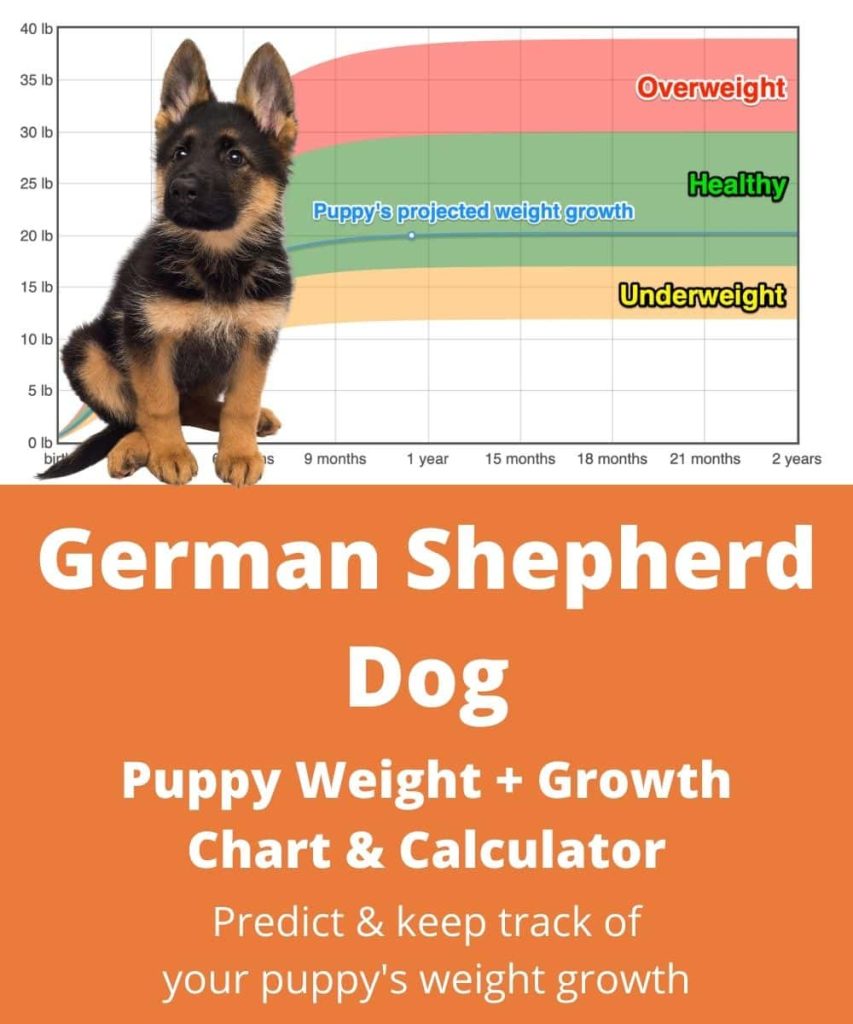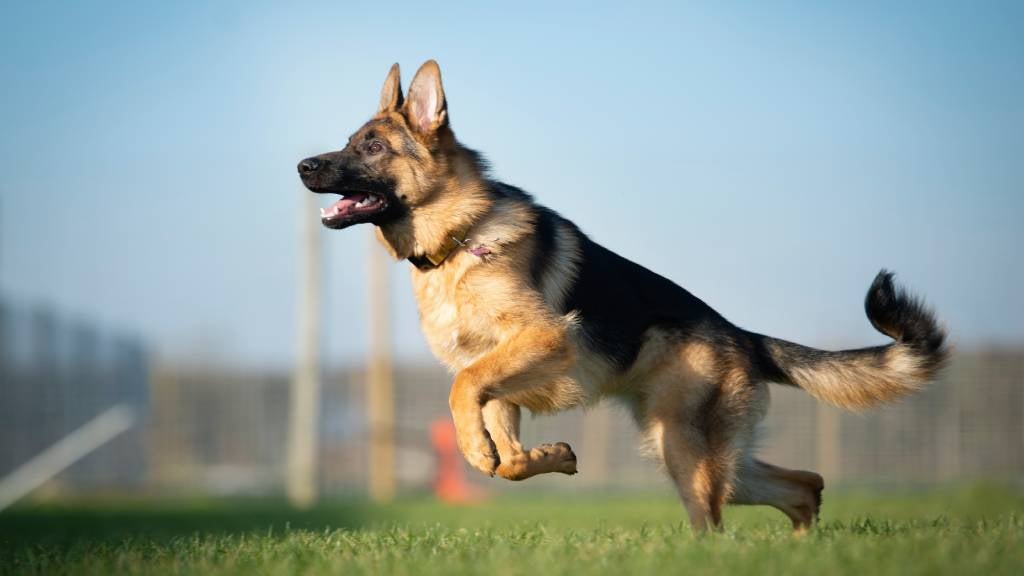Congratulations on your new 10-week-old German Shepherd puppy! They bring you years of love and companionship, but plenty of other things come with owning a pup. Among these things is ensuring your puppy is growing at a healthy rate. The plurality of German Shepherds reach their full adult size by six months, so you know the development process starts from day one.
One way to gauge the health and development of your pup is by monitoring its weight. Several factors play a role in the poundage of 10-week-old German Shepherds, such as genetics and diet. In this article, we shall help you understand how much your puppy should weigh at this age and how you can ensure it achieves its full potential in the weeks. Let us get started!
Average Weight of 10-Week-Old German Shepherds
So, just how much should your 10-week-old German Shepherd weigh? Generally, 10-week-old German Shepherd puppies can cogitate anywhere between 7-40 lbs, a rough estimate. The average pup thickness will also depend on the size of its puppy parents tend to be larger than the ones whose parents were on the slighter side.

Not only that, but it is the main point to remember that your puppy’s weight and size are rapidly increasing. In the first few weeks of life, most puppy weight is doubled or tripled by the time they reach ten weeks old. So while your puppy may have weighed roughly 15 lbs at eight weeks, they could gain five extra lbs in just two weeks.
For a more accurate picture of your puppy’s weight and size, it is best to consult a veterinarian who can assess them directly. With their help and regular visits, you can accurately measure your puppy’s growth rate, health, and happiness throughout its development.
Factors That Affect a German Shepherd Puppies Weight
Several factors can influence the weight of a 10-week-old German Shepherd puppy. First, the size of their mother and litter size can affect the puppies’ birth weight. Second, male puppies typically weigh approximately 62-68 pounds, while female puppies weigh around 53-58 pounds. Finally, you remember that German Shepherds commonly range in weight from 49-88 pounds, so your pup may fall anywhere within this range.
If you want to gain more information about your puppy’s growth, it is best to consult your veterinarian for personalized advice about nutrition and weight gain. A puppy should gain from 3/4 – 1 pound each week as they grow and develop during their first few months!
Common Growth Rate for German Shepherds
You might not know it, but the ordinary growth rate for 10-week-old German Shepherds is surprisingly fast! German Shepherds weigh about 22 to 34 pounds when they grow to between 46 and 90 pounds by the time they are a year old.
On average, ten weeks of German Shepherd puppies should weigh around 26 to 29 pounds. To get a good idea of your puppy’s weight and whether they are growing as they should be, have your vet do regular check-ups every four weeks until they are six months old.
Factors That Influence Weight Gain
A few factors can influence weight gain in German Shepherds, such as:
- Genetics: Genetics will play a vital role in how much your pup weighs compared to other pups of the same age
- Exercise: Exercise is critical for having a physically healthy pup, so be sure that you are building up their physical activity levels as they grow
- Diet: A balanced diet of fresh food or specially formulated puppy food is essential for helping them reach their ideal weight
- Health Problems: If your pup is suffering from any health problems, it can cause them to be underweight or overweight for their age
By taking note of all these things and regularly checking in with your vet, you can ensure that your 10-week-old German Shepherd is growing at a healthy life!
Potential Causes for Weight Gain or Loss

It is vital to understand that 10-week-old German Shepherds can experience weight gain or loss, and recognizing potential causes is pivotal to helping your dog reach and stay at a healthy weight.
Poor Nutrition
Poor nutrition is one of the leading causes of weight gain in German Shepherds. Your dog needs a balanced diet of vitamins, minerals, proteins, and other essential nutrients to grow and thrive. Make it believable that you are giving your dog only high-quality foods and the right portion size for their age, size, and activity level.
Worms or Parasites
Worms or parasites can also cause weight issues in puppies like German Shepherds if left untreated. Common worms like roundworms can live in your pet’s digestive tract and feed off nutrients from their food, resulting in poor nutrient absorption as well as unhealthy weight loss. If you suspect anything abnormal about your puppy’s behavior or health, it is always best to take them to the vet for an exam.
Lack of Exercise
Without enough exercise and activity levels for their age and aiming for short walks each day with plenty of playtimes (at least 20 minutes a day) puppies stay active and healthy!
What 10-Week-Old German Shepherds Should Eat?
At ten weeks old, a German Shepherd puppy’s diet should consist of a balanced mix of proteins, carbs, fats, vitamins, and minerals. Puppies need more nutrients than adult dogs because their cells are growing fast. Quality puppy food should provide all the necessary nutrients in an easily digestible form.
Make sure you get puppy food specifically formulated for German Shepherds. Since this breed grows swiftly, they need extra calcium and protein for proper growth and development. Look for a food that lists at least 22% protein and 8% fat on the label.
An ideal puppy diet should consist such as:
- Protein which is essential for your puppy’s growth and development
- Fruits and vegetables like apples, carrots, squash, or sweet potatoes provide vital vitamins and minerals
- Omega fatty acids like those found in fish oil to strengthen skin and coat health
- High levels of antioxidants to boost their immune system
- A mixture of carbohydrates such as oats or brown rice will provide energy and help digestion.
If you have any questions or doubts about the correct type of food for your 10-week-old German Shepherd puppy, contact your veterinarian to ensure that your pup is gaining all the nutrition he needs for optimal growth and development.
When to Get Professional Advice
When it comes to knowing the weight of a 10-week-old German Shepherd, it is vital to remember that there is no one-size-fits-all formula. If you are ever in doubt about your pup’s health and well-being, it is always a good idea to gain experienced advice.
You should not take it lightly—your puppy’s health and future development could depend on it. Here are some signs that you should visit the vet:
- Your German Shepherd is not gaining weight
- Your pup appears weak or lethargic
- There is a noticeable change in behavior
- You observe changes in your puppy’s stool or urine
If you spot any of these signs, do not hesitate to go to a trusted vet for help. They allowed you to recommend the best diet for your pup and monitor their growth and development for anyone potential issues. With cautiousness and nourishment, your little puppy will grow into a healthy adult German Shepherd.
How to Monitor Your German Shepherd Pup’s Weight

Monitoring your German shepherd puppy’s development is pivotal to making it believable that growing appropriately and is healthy. The right way to do this is by keeping an eye on their weight.
German Shepherd puppies usually weigh from 0.8-1.3 lbs (370-600 g) at birth, and at one week of age, they should have doubled that weight at least. During the eight weeks following delivery your pup will grow incredibly fast, so much so that by the time they are eight weeks old, they should weigh between 18-22 pounds.
When monitoring your puppy’s development, you look for any signs of difficulty while growing or gaining weight. If you think you might contact your vet to investigate further and get a professional consult; it is always best to be safe than sorry!
Nutrient Requirements of 10-Week-Old German Shepherd Puppies
If you are a proud German Shepherd pup parent, you want your pup to gain the right amount of nutrients. Ten weeks old, German shepherds should weigh around 20 to 25 pounds and approximately 1 to 1.5 pounds per week. To confirm your puppy is fulfilling these growth milestones, he needs the perfect diet.
High-Quality Food
It is best to purchase high-quality food specifically formulated for puppies and large-breed adult dogs. Large-breed puppies have unique needs, so a diet that meets these requirements during their growth and development time comprises fish oil and omega-3 fatty acids for healthy skin and coat, as glucosamine for healthy joint development.
Feeding Guidelines
Most foods will include feeding guidelines specific to your puppies’ weight on the back of the bag or the working website. It is vital to follow these guidelines explicitly because overfeeding can cause obesity, which can guide kinds of health issues life such as hip and elbow dysplasia. If you prefer wet food, it contains at least 70 percent moisture content, which helps keep puppies hydrated while they feed.
Taking care of German shepherd puppies requires special attention in terms of their dietary needs —but provide your dog with the right combination of high-quality food and adequate nutrition, and he will develop into the best canine companion for years to come!
Best Practices for Feeding a 10-Week-Old German Shepherd
If you have gained a 10-week-old German Shepherd, you should know that it is essential for them to get the best nutrition to ensure their health and happiness. With that said, here are some best practices for feeding your pup:
Establish a Feeding Schedule
Your pup will do best with a consistent feeding schedule. It helps to understand when meals are coming and helps regulate their digestion. Feed your puppy at all times every day.
Meet Their Nutritional Needs
German Shepherds need all the essential vitamins, minerals, and macronutrients like proteins and fats that all dogs need. When choosing dog food, look for foods with high-quality ingredients like proteins and omega-3 fatty acids that support a healthy coat and brain development.
Monitor Portion Size
You will want to keep notice of your puppy’s portion size so they do not gain too much weight or become malnourished. As a general guideline, most 10-week-old German Shepherds will need about 2 cups of dry food per day split into two separate meals. As your pup grows older, you can adjust its portion sizes thus for optimal health.
By obeying these tips, you will ensure your puppy gets the nutrition they need for good health and growth!
Adequate Exercise for a 10-Week-Old German Shepherd

You may have heard that dogs need exercise, which is the reality for a 10-week-old German Shepherd. After all, puppies are bundles of energy and burn off that excess energy to stay healthy and happy.
But how much exercise should your 10-week-old German Shepherd get? Here are a few tips:
Frequency
Your puppy should go for at least two or three 20-minute walks daily. Keep remaining that the puppy, so be sure to start with shorter walks and gradually increase their length as they older. You can also run around an open area for about 15 minutes each day – this will help to strengthen his muscles and burn off any extra energy he might have from playtime.
Type of Exercise
Walks are great for improving your puppy’s overall health, but you also do other activities with him. Taking him swimming or letting him play fetch will help keep him entertained while burning off energy at the same time. You can also incorporate mental exercises into his routine by teaching him basic commands.
Remember: exercising your puppy is essential to helping him stay healthy – so make sure you set aside time each day for quality time with your four-legged friend!
Conclusion
As a future dog parent, it is crucial to scrutinize your 10-week-old German Shepherd puppy’s weight. In their first few months, puppies can triple their birth weight in a brief period. However, avoiding overfeeding and keeping their weight in check can help them in optimal health.
Make sure your puppy is dwelling on track, and try to update their proportions and compare them to average weight charts. If your puppy is growing too quickly or has a large appetite, you may have to cut back on the food you give them to reach the right weight.
Although mindful of your puppy’s weight, do not neglect to provide plenty of exercises and mental stimulation to help them stay healthy and happy. With a status diet and dynamic lifestyle, your 10-week-old German Shepherd will develop into a healthy and beautiful adult dog.
